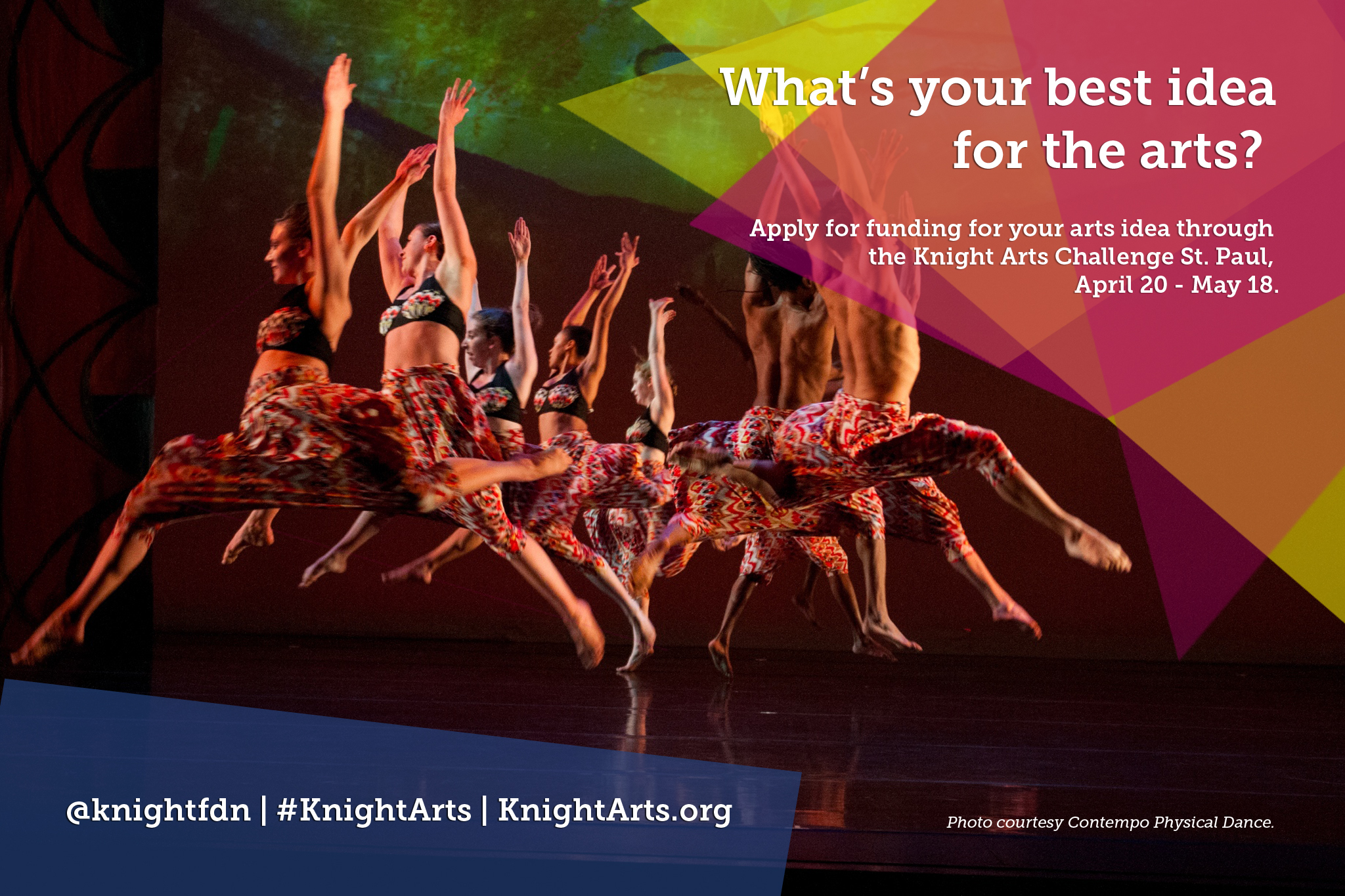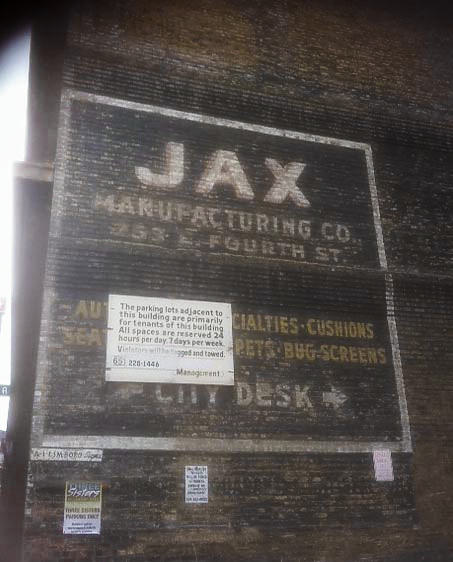
St. Paul: Send in your best ideas for the Knight Arts Challenge
The door is (officially) wide open St. Paul: Starting today, you can send in your best ideas for the arts for a chance at funding through the Knight Arts Challenge.
The deadline is May 18th, the application available here at KnightArts.org, and there are just three rules to follow:
- The project must be about art.
- It must take place in or benefit St. Paul
- You must find additional funding to match the Knight Foundation grant.
If your idea falls within these three rules, you’re eligible. And that means everyone from private companies to nonprofit organizations and individuals.
GET UPDATES ON ST. PAUL ARTS Email (required) First Name Last Name Organization
You don’t have to live or work in St. Paul either. Your idea just has to take place in or benefit the city. The Knight Arts Challenge St. Paul is truly open to anyone.
Yet knowing the rules and being told this the challenge is open to anyone can still leave a lot of questions. You can attend one of Knight Foundation’s Community Q&A sessions April 27-29 to get answers. (the schedule is below.)
In the meantime, for some more immediate help, we reached out to a group of 2014 challenge winners for their advice on applying.
Here’s what they had to say:
How did you know when you’d had an idea that might interest the reviewers at Knight Foundation?
“Our proposal is one that when we tell people we’re doing it, most people did say ‘Ooo. I want to see that.’ That immediate response from the simple idea of it was definitely something the Knight Arts people recommended we try to elicit when developing the 150 words.”
– Alan Berks of Wonderlust Productions’ “The Capitol Play Project”
Did you have your full proposal figured out before you submitted a summary in the application?
“Gosh, no, not even close! I didn’t exactly stop at the idea because an idea that can’t be turned into reality isn’t worth much in my mind. So even though the Knight Foundation stressed innovative thinking, I took this to mean innovative thinking grounded at least slightly in reality. Before submitting my idea, I therefore did some quick research to reality-check my concept.”
– Tom Surprenant of Stahl Construction’s “Restoration of Lowertown Signs” project
“No, I most certainly did not. As an individual who wouldn’t have otherwise had the capacity to complete my project without the Knight Arts grant, I had a good idea of what I hoped to accomplish, but it was being named a finalist that pushed me to develop a full proposal.”
– Jonathan Oppenheimer of the “Midway Mural” project

What steps did you take to test your idea before submitting it?
“I did talk to colleagues and friends, and I did some online research to see if other people in other places were doing any similar things. Most ideas are reinventions and I was actually happy to see successful projects using my idea elsewhere.”
– Tom Surprenant of Stahl Construction’s “Restoration of Lowertown Signs” project
“I knew that this was a project that I not only needed help from other artists, I needed artists who were excited about the project and willing to see it through. I was working with a couple of actresses on a Fringe production and pitched the idea to them…and I saw their eyes light up in a way that I knew I would definitely have their support. After that, I ran the idea past other artists in the community and they asked me all manner of questions about it, which was amazingly helpful. The questions your colleagues are asking are the problems you want to think about solving right off the bat.”
– Amber Bjork, of the “Winding Sheet Outfit” project
“I had a few ideas, but the winning idea was the one I was most passionate about and had thought most about. It was not something I just threw out there and hoped would take hold; I had spent a long time crafting this vision and asking community partners whether they’d be on board if it came to fruition. If I had simply received the grant without ensuring I could pull off the project, I would have put myself in quite a bind. All of which is to say that the idea requires some foresight, some homework, a lot of passion, and a big dream. And if you’re lucky, it may just all work out.”
– Jonathan Oppenheimer of the “Midway Mural” project
[[vimeo 113798983]]
What other tips would you share with prospective applicants?
“Think about money. As you think about resources you have, also consider what resources could open up if you were to receive a grant. And don’t be afraid to take a risk if you have any chance of succeeding.”
– Tom Surprenant of Stahl Construction’s “Restoration of Lowertown Signs” project
“Focus on the title and craft your 30-second elevator speech about the project. It’s important that other people can immediately grasp the concept of the project. The transfer of “the spark” has been one of the most exciting characteristics of the project to date, and it all starts with the language you craft about your project.”
– Shannon Forney, of the “Smallest Museum in St. Paul” project
“Think beyond cool arts projects to how your idea will engage the community in meaningful ways, especially communities that have traditionally been marginalized when it comes to the arts and arts programming. Think outside the box and put forth the idea that everyone else may think is crazy or non-traditional. Put forth ideas that you are personally invested in: Those are the ideas that reveal the most passion, excitement, and commitment. Think about lasting impact in the community, in terms of beauty, ongoing conversations, and new ways of thinking and interacting. And then hope for the best, but know that it’s possible for anyone, regardless of your affiliation with an organization, non-profit, or business. And that’s what makes the Knight Arts Challenge so unique.”
– Jonathan Oppenheimer of the “Midway Mural” project
Join us for one of our Community Q&A events to get your questions answered:
- 6 p.m. April 27, Open Book, 1011 Washington Ave., Minneapolis
- 8:30 a.m. April 28, The Dubliner, 2162 University Ave. W, St. Paul
- 6 p.m. April 28, Rondo Library, 461 N. Dale St., St. Paul
- 8:30 a.m. April 29, Walker West, 760 Selby Ave., St. Paul
Thanks to our Q&A co-hosts: Intermedia Arts, Mixed Blood Theatre, Ananya Dance Theater, The Dubliner, Creative Enterprise Zone, East Side Arts Council, Springboard for the Arts, TU Dance, Center for Hmong Arts & Talent, West Side Community Organization, Penumbra Theatre, American Composers Forum, Selby Avenue Action Coalition/Rondo Community Land Trust and Walker West.
Recent Content
-
Artsarticle ·
-
Artsarticle ·
-
Artsarticle ·


